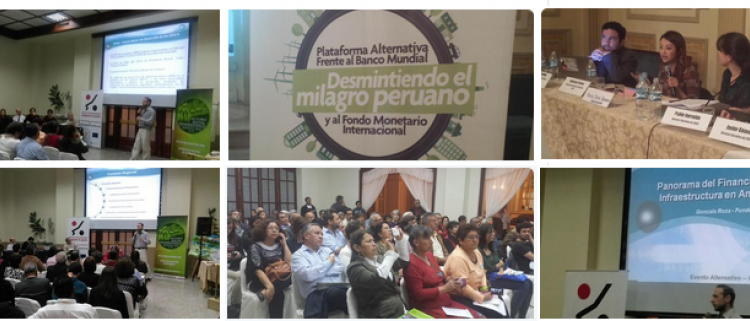The World Bank and International Monetary Fund annual meetings: considerations
The World Bank and International Monetary Fund annual meetings took place from October 5 to 12 in Lima, Perú. Fundeps, as a member of GREFI (Regional Group on Financing and Infraestructure), co-organized an alternative event which included a demonstration that connected non governmental organization and grassroots movements. In these events, Fundeps participated in many debates and presentations connected to environmental protection, human rights and participation. As a result of this work in Lima, as member of GREFI, we share some thoughts on the ongoing events and on the upcoming challenges as civil society organizations.
1. First, we wish to thank the efforts of all the people and institutions that turned the alternative forum into a space to discuss the role international financial institutions have in our region and in the world.
2. We created a space in which thousands of people, many organizations and social movements took part. We hope this space has fostered the creation of networks that will help continuing this cooperation.
3. This space allowed us to raise other perspectives on the financing for development processes. These processes have a significant impact on the environment and on people’s rights. They also consolidate decision-making processes which are actually disconnected from the people they are supposed to benefit.
4. We believe that a major merit of this shared effort was the connection between demands which came from different levels and actors. In this way, systemic claims were made regarding the extractivism model and also regarding global decision-making processes which haven not incorporated participation and accountability mechanisms.
5. We were able to connect the weakening processes of socio-environmental standard in international financial institutions, with similar processes occurring at a local level. These processes imply either the significant weakening of socio-environmental legal guarantees, or the lack of enforcement of these guarantees. These processes generate a large number of socio-environmental conflicts, in which many different rights are being infringed.
6. In this context, we also note the massive demonstration, which conveyed another message to the official meetings, raising many claims.
Regarding the challenges that lie before us, we hope to keep making the effort of connecting global debates with local and regional needs. In this respect, we especially that this is especially applicable to the ongoing discussions around the World Bank safeguard policies.
On that point, and regarding the elements above, we are especially concerned by the dynamics of competition, which could weaken protection frameworks, as they give more importance to the action of the World Bank as a financial entity rather than to its role as an actor of development policies. Besides, regarding the weakening of legal frameworks in national and regional contexts, we are concerned about the decision to rely on country systems without creating mechanisms of implementation review.
We believe that part of our strategy regarding the social and environmental safeguards review, which involved discussing different issues of concern separately, may have weakened our argument by fragmenting the topics under debate.
Perhaps this could explain why the World Bank kept going forward in this process, despite a widespread disapproval. In our experience in Lima, we were able to connect many different demands, gather them in one sole opposition strategy and connect these claims with the local and regional contexts. Perhaps this experience will be the starting point of future collective efforts.
For further information: www.grefi.info
Contact:
Gonzalo Roza / Coordinator for Global Governance Programme
Juan Carballo / Executive Director
juanmcarballo@fundps.org



